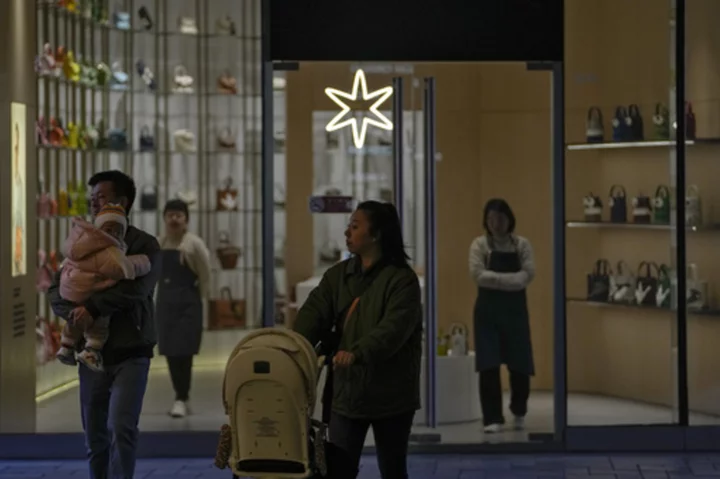BEIJING (AP) — China's economy showed more signs of reviving in October as retail sales and manufacturing picked up though the property sector remained sluggish, the government said Wednesday.
Factory output rose 4.6% from a year earlier in October, while retail sales jumped 7.6%, helped by robust spending during the weeklong National Day holidays.
But real estate investment sank 9.3%, and officials acknowledged that the industry was still in the “midst of adjustment,” after a crackdown on excessive borrowing by developers two years ago, coupled with the pandemic, plunged the industry into crisis.
Disruptions to manufacturing, transport, travel and virtually every other aspect of life during the pandemic ended nearly a year ago when China's leaders abandoned their “zero-COVID” policies aimed at preventing infections.
So improved economic data from October also reflect lower rates of growth a year earlier. Overall, China's recovery from the pandemic has been fitful, though recently activity has revived, leading many economists to upgrade their estimates for growth this year to above the government's target of about 5%.
China’s economy slowed in the summer as global demand for its exports faltered and the property sector deteriorated further. The economy expanded at a 4.9% annual pace in July-September, beating analysts’ forecasts of about 4.5%, official data show. But that was much slower than the 6.3% annual growth rate of the previous quarter.
The recent evidence that the world’s No. 2 economy is again gaining steam comes just as President Xi Jinping is due to meet later Wednesday with U.S. President Joe Biden on the sidelines of a Pacific Rim summit in California.
Briefing reporters in Beijing, Liu Aihua, a spokesman for the National Bureau of Statistics, repeatedly emphasized China's transition to new models of growth, part of a decades-long shift from rapid industrialization and heavy investments in factories, ports and other infrastructure to a more sustainable pace of growth led by consumer spending.
The economy was continuing to improve under “effective” policies, though its recovery was experiencing “wave-like development and tortuous progress,” he said. “At present, the external pressure is still great, the constraints of insufficient domestic demand are still prominent, enterprises have many difficulties in production and operation, and hidden risks in some fields require much attention,” Liu said.
The report showed consumer spending is playing an increasingly important role in driving growth, with consumption contributing 83.2% to economic growth in January-October, up 6% from the same period a year earlier. Given the wide gap between the incomes of city dwellers and people living in rural areas, there is ample room for growth, Liu said.
The auto industry stands out. Sales of passenger cars rose 10.2% in October over a year earlier as makers ramped up promotions and customers opted for electric and hybrid vehicles. Exports of passenger cars jumped nearly 50% to 391,000 units in October and have risen 66% this year, to just over 3 million units, the China Passenger Car Association reported last week.
But he acknowledged that Chinese families have limited leeway to spend and that employment remains an issue.
Overall unemployment remained at 5% in October. The government stopped announcing the rate of unemployment for young workers months ago, once it topped 20%.
Liu said the statistics bureau and other relevant departments were researching the issue and working to improve collection of statistics and that updates on the situation would be released “at an appropriate time.”

